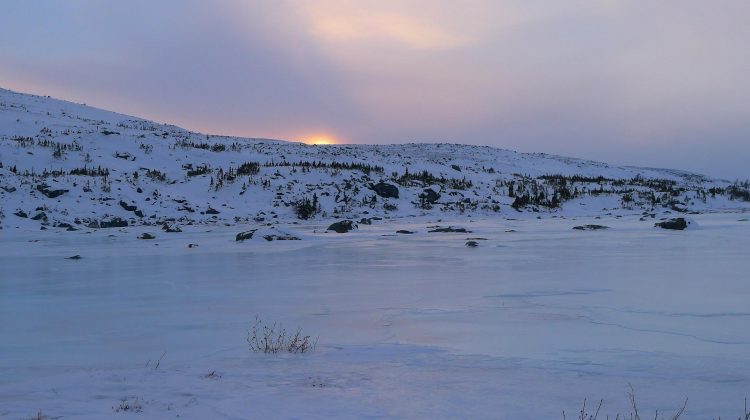
New ‘Business As Usual’ with Russia Affects Arctic Climate Response, Experts Say
As global heating brings dire ecological challenges and new resource opportunities to the Arctic, international security experts agree that stakeholder nations must work together to navigate the changing security dynamics—with the exclusion of Russia, whose war in Ukraine is threatening international order.
“Climate change is increasingly referred to as a defining threat in the Arctic and outside the Arctic,” said Pauline Pic, a PhD candidate at Université Laval and moderator of the Montreal Climate Security Summit’s panel on the New Arctic Security Environment.
She added that rising temperatures have implications for Arctic security, for security reconfiguration, and even for the very definition of security. In this context, it could be argued that the Ukraine conflict has “redefined Arctic geopolitics,” Pic said, though it remains to be determined just how much.
In his opening comments to the panel, Dr. P. Whitney Lackenbauer, Canada Research Chair in the Study of the Canadian North, said Canada and other nations in the North Atlantic Treaty Organization (NATO) “have an important role to play in understanding and addressing threats stemming from or exacerbated by a changing climate, both globally and regionally.” Lackenbauer pointed to a NATO report that describes climate change as “one of the defining challenges of our times,” and a “threat multiplier” that is likely to “dramatically alter the environments in which allied militaries operate, which will make future operations increasingly complex.”
“It leads to instability, geostrategic competition, it creates conditions that can be exploited by state and non-state actors that threaten or challenge our alliances,” he said, adding that NATO countries need to increase monitoring and tracking of climate change and how it will affect security interests. He also predicted heightened demand for militaries to provide humanitarian assistance to address climate change impacts, and for NATO to transform how it addresses environmental changes by “anticipating, preventing, and building resilience and expectation of these crises” instead of only training for crisis management.
Future policy for Arctic security will also be influenced by competition, as warming makes resources newly available in Arctic areas, added Kimberly Rebenchuk, domains and technology policy director at the Department of National Defence (DND). She noted that Russia has increased its presence in the Arctic in recent years, aiming to advance its development of Arctic oil and gas resources. China, a “self-styled near Arctic state”, is also trying to get a foothold in the region to advance the “economic and geostrategic ambitions” of the country’s polar Silk Road, she said.
The growing partnership between China and Russia will affect Canada’s Arctic security, added Rebenchuk, so Canada will need to work closely with other NATO members to exchange expertise and strategize on adapting militaries to changing environments.
“The Arctic is at a critical point where climate change and economic and geopolitical competition are coming together,” she concluded. “And in the face of these unprecedented challenges, Canada and our allies must prepare to respond to the realities of climate change, strengthen the lives of northerners, provide increased security, and address the ongoing competition that threatens the rules-based international order.”
But Ambassador Michael Mann, European Union special envoy for Arctic matters, warned that circumpolar security and cooperation will have to adapt to continue operating while also excluding Russia. “There is no way we can have business as usual with Russia when it’s engaged in acts of international law breaking and terrible acts of slaughter in Ukraine.”
This perspective was echoed by Tom Dunne, deputy director strategy, policy and plans for NORAD & United States Northern Command, who also sees current events changing international cooperation in the Arctic.
“We cannot assume the continuation of a peaceful and stable Arctic based on the voluntary adherence of all the nations to the international rules-based order,” he said. “We need to ensure that we are able to be there and protected.”
Some outside perspectives suggest it may be helpful to reimagine how to define and address security issues as the various countries prepare for potential security threats from Arctic resource competition. Dr. Olaf Corry, a professor of global security challenges at the University of Leeds, warned that competition over newly accessible resources could work counter to timely preventative action on climate change.
If security is reimagined as a new approach that sees climate security as “the emergency ‘defence’ of natural systems and vulnerable human societies, then perhaps more preventative and egalitarian climate measures could be pushed up the political agenda,” Corry told The Energy Mix. However, considering how responses to the ongoing climate system crisis and international system crisis have taken form, “there’s a real risk the Arctic becomes a theatre for wider geopolitical dynamics that currently are spiraling out of control.”
Primary Author: Christopher Bonasia
This article by Christopher Bonasia, https://theenergymix.com/ is published here as part of the global journalism collaboration Covering Climate Now.
